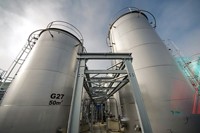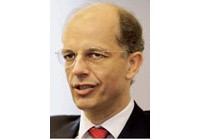Advertisement
Grab your lab coat. Let's get started
Welcome!
Welcome!
Create an account below to get 6 C&EN articles per month, receive newsletters and more - all free.
It seems this is your first time logging in online. Please enter the following information to continue.
As an ACS member you automatically get access to this site. All we need is few more details to create your reading experience.
Not you? Sign in with a different account.
Not you? Sign in with a different account.
ERROR 1
ERROR 1
ERROR 2
ERROR 2
ERROR 2
ERROR 2
ERROR 2
Password and Confirm password must match.
If you have an ACS member number, please enter it here so we can link this account to your membership. (optional)
ERROR 2
ACS values your privacy. By submitting your information, you are gaining access to C&EN and subscribing to our weekly newsletter. We use the information you provide to make your reading experience better, and we will never sell your data to third party members.
Business
Marijn E. Dekkers
The Thermo Fisher CEO is getting another big promotion: the top job at Bayer
by Alexander H. Tullo
October 12, 2009
| A version of this story appeared in
Volume 87, Issue 41
When Bayer named Thermo Fisher Scientific Chief Executive Officer Marijn E. Dekkers to replace Werner Wenning as its next CEO, the move was a surprise. Dekkers was a Bayer outsider and not even German. And although Thermo Fisher is the world's largest supplier of instruments and consumables to labs thanks to Dekkers, the firm is a fraction of the size of the German chemical and pharmaceutical giant.
The new job, however, fits Dekkers' career path perfectly. Throughout his professional life, he has sought increasingly complex managerial challenges. And if the willingness of his higher-ups to give him new opportunities is any guide, he has been rising to those tasks.
The first leap in Dekkers' career was from academia to the corporate world. As a graduate student in chemical engineering at Eindhoven University of Technology, in the Netherlands, Dekkers was a specialist in polymer blends, publishing numerous technical articles and filing several patents. His professor at the time was an adviser to GE Plastics and would let Dekkers tag along when he visited GE's lab in Bergen op Zoom, the Netherlands. "I could be a fly on the wall when he had conversations with the GE guys," Dekkers recalls.
When Dekkers finished graduate school, he sought a stint at a large U.S. research center to jump-start an academic career. In 1985, his prior experience made him an attractive hire for General Electric's corporate research center in Niskayuna, N.Y. William F. Banholzer, now chief technology officer at Dow Chemical, and Thomas J. Stanley, the technology head of SABIC Innovative Plastics, formerly GE Plastics, were both Dekkers' colleagues there at the time.
Dekkers never returned to academia. Instead, after only three years at GE, he became the head of polymers material research in Niskayuna. At the time, GE had a big problem. Its Noryl polyphenylene oxide/polystyrene blends, which had dominated the electronic-housing market for years, tended to yellow and crack over time. Dow and Bayer started taking market share away from Noryl with their polycarbonate/acrylonitrile-butadiene-styrene (PC/ABS) blends.
GE, a polycarbonate producer, bought Borg-Warner Chemicals in 1988 to get its hands on an ABS business. Dekkers moved to a former Borg-Warner facility in Parkersburg, W.Va., to head a team of about 30 scientists vested with developing GE's own PC/ABS blend. The team came up with Cycoloy resin, which helped GE preserve its market share in electronics. Dekkers was named technologist of the year at GE Plastics.
Dekkers liked the taste of management that came with the Cycoloy effort. "I got to visit a lot of customers and got very involved with the business aspects—such as manufacturing and pricing," he says. "I actually enjoyed it and thought maybe at some point I don't just want to run a technology group, but I really want to run a business."
AlliedSignal, which later became Honeywell International, gave him that chance in 1995. He ran the company's specialty films business and then took on its bigger fluorine chemicals unit, which had about $800 million in annual sales. In 1999, he took the helm of the firm's $1.5 billion electronic materials unit.
Again, Dekkers looked for a promotion. "I thought I would like my own show, my own public company, at some point," he remembers thinking. But that was tough to do at a big conglomerate like AlliedSignal. In 2000, he was offered the position of chief operating officer (COO) at Thermo Electron, a distressed holding company that had stakes in 24 different public firms.
Thermo Electron wanted to sell off more than half of its businesses and then absorb nine other companies that made analytical instruments as wholly owned subsidiaries. So Dekkers' job came with an understanding: If he could make a coherent whole out of those units, he would become CEO. If he couldn't, Thermo would sell them off and, in Dekkers' words, "there would be nothing to be CEO of." He succeeded and attained the position in 2002.
Dekkers' biggest endeavor as CEO at Thermo was its 2006 acquisition of Fisher Scientific, a supplier of chemicals and other laboratory consumables. Fisher was a much bigger company, with 2005 sales of $5.6 billion compared with Thermo's $2.6 billion.
Fisher shareholders got a measly 7% premium for their stock, and over the next several years, Dekkers had to prove to them that the deal was worth their while. The combined Thermo Fisher could offer a comprehensive line of products, enabling large pharmaceutical, biotechnology, and university clients to bundle purchases and save money. "We have grown tremendously since the merger with these accounts because they see the value of the rationalization of a very fragmented supplier base," he says.
Dekkers wraps up his time with Thermo Fisher this month and will then pass the reins to COO Marc N. Casper. Joining the Bayer management board on Jan. 1, 2010, Dekkers will later become interim CEO of Bayer HealthCare, replacing Arthur J. Higgins, who was once thought of as a possible successor to Wenning. Dekkers will become Bayer CEO next October.
There's not much of a story behind how he came in contact with Bayer: He was on a list of possible non-Bayer candidates and was called in for an interview. "A prerequisite for the job is that you can speak German reasonably," he says.
But Dekkers acknowledges that Bayer probably took a hard look at his experience. With Solvay's pending exit from pharmaceuticals, Bayer will be one of two European chemical-pharmaceutical hybrid firms, along with Merck KGaA. Wenning had made acquisitions to shape Bayer's portfolio, and some observers suspect more realignment is in store. "The fact that I have done one big acquisition and other, smaller acquisitions, I think, helps," Dekkers says.
He brushes off the culture shock of going from an American to a German company. "The Netherlands to the U.S. was an adjustment as well," he points out.






Join the conversation
Contact the reporter
Submit a Letter to the Editor for publication
Engage with us on Twitter